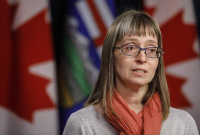Support strong Canadian climate journalism for 2025
Alberta is bumping up salaries, funding and hiring at long-term care centres, which have been hit hard with COVID-19 infections and deaths.
Health Minister Tyler Shandro said there will be increased funding for the facilities to hire additional staff and a wage supplement of $2 an hour for health-care aides.
The province will also fast track health-care aide students through their programs using paid practicums to get more of them into care homes right away.
"This will mean up to 1,000 student placements," Shandro told reporters Monday.
"We're confident that these measures will make a difference to ensure that our continuing-care facilities in Alberta are as safe as possible."
He said $24.5 million will also be advanced to care home operators to address pressing needs.
Alberta has recorded 59 deaths due to the novel coronavirus, with 38 of them in continuing-care centres.
Of those, 21 have been in Calgary's McKenzie Towne Continuing Care Centre and another seven have been at the Manoir du Lac retirement home in McLennan in northern Alberta.
Last week, the province took over operation of Manoir du Lac after officials determined residents were not being cared for safely.
The care homes are under strict health safety rules. Visitors are banned except for dire circumstances and staffers are no longer allowed to work at more than one centre.
NDP labour critic Christina Gray, in a statement, said the new measures are a step in the right direction but she's still frustrated.
"It took two weeks of dithering from Jason Kenney and the UCP government to introduce these common-sense measures. Our Official Opposition called for these actions on April 7."
On Monday, Alberta also reported 105 new cases for a total of 2,908 infections in the province. So far 1,230 people have recovered.
Alberta Health Services continues to buy masks and other personal protective equipment from a variety of suppliers.
Jitendra Prasad, head of procurement for AHS, addressed concerns Monday from health workers that some masks coming in from a Chinese supplier don't fit properly, cause skin rashes and have a funky, offensive smell.
Prasad said the masks have been certified as medically safe but staff are working with the suppliers to address issues such as better-fitting nose clips and the rashes.
He said the smell comes from the fact the masks are heated during production then immediately sealed in plastic, resulting in the odour when the packages are opened.
"We've had staff over the last many days that have actually taken out the masks out from those plastic wrappings and they have put those masks in boxes so they can get aired out," said Prasad.
A work camp at Imperial Oil's Kearl oilsands project in northeastern Alberta, which flies in workers from across Canada, has 12 confirmed COVID-19 cases in Alberta, along with eight diagnosed in other provinces.
There are reports of Kearl-linked cases in Saskatchewan, British Columbia, New Brunswick and Nova Scotia, and Deena Hinshaw, Alberta's chief medical officer of health, said officials are working to verify them.
Dr. Nnamdi Ndubuka, with the Northern Inter-Tribal Health Authority in Saskatchewan, said that six cases in an Indigenous community in the province's northwest have been linked to a worker who travelled there from Kearl. The Saskatchewan Health Authority said that outbreak is in the La Loche area.
This report by The Canadian Press was first published April 20, 2020.
— with files from Lauren Krugel in Calgary





Comments
Good moves. It can be stopped in those homes, but only with concerted, focused effort, and only when the staff of those homes do not work also in other homes.
As for Kearl, we are grateful for Dr Kenney making it an essential service, we were short of things to do in Alberta, and needed another outbreak.